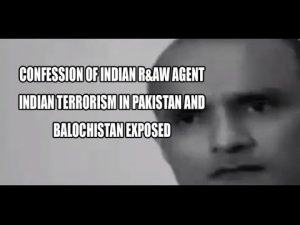Newspaper Article 25/05/2017
At the G20 Summit, Prime Minister Narendra Modi remarked: “one single nation in South Asia is spreading the agents of terror in the countries of our region.” The reference was towards Pakistan. By passing such remarks against the country having fought militancy for more than a decade, India has been trying to build up a case against Pakistan. However, the arrest of Kulbhushan Yadav from Balochistan on account of espionage and sabotage has made India a culprit itself. Yadav was running a clandestine terror network in Balochistan, and had confessed links with the extremist groups, testifying Pakistan’s concerns over India’s destabilizing role. It also signals to the hostile regional actors that Pakistan’s Law Enforcement Agencies (LEAs) are quite vigilant and well prepared to the nefarious designs. Yadav had been sentenced to death by a Field General Court Martial (FGCM) under the Pakistan Army Act (PAA). India had reacted to the decision, the Pakistan High Commissioner in New Delhi was summoned and was told that India would consider the death sentence as a “pre-mediated murder”.
The threatening tone from India cannot be termed as mere rhetoric. It will impact the Pakistan-India relations. New Delhi would try to diplomatically pressurize Pakistan. Firing across the Line of Control (LoC) and the atrocities in the Indian Occupied Kashmir (IOK) may also intensify. India claims that Yadav is a former Navy commander and had business setup in Iran from where he was arrested. Yadav’s confession of subversion was aired and had been seen by regional and global audiences. The confession is a proof that Yadav is not a non-state actor, rather, he is a RAW operator (“state actor”), assigned to sabotage the ongoing development work in Balochistan. India is trying to protect its spy. To fight the case of Yadav, India has also approached the International Court of Justice (ICJ) for consular access and to avert the death sentence. In case of Yadav, India has involved a third party, but when it is Kashmir or other bilateral disputes with Pakistan, India maintains that the issues should be solved without involving a third party.
Pakistan is a sovereign state headed by a democratic government, any attempt targeted at the country’s security cannot be pardoned. The country’s population had stood beside the military in the fight against militancy. The CPEC is a ray of hope and opportunity for the people of Pakistan. CPEC would transform Pakistan into a trading hub, thereby, people have a lot of expectations, and would want early materialization of the corridor. Any adversarial attempt targeted at Gwadar or the CPEC would be seen as an attack on Pakistan’s sovereignty and progress. Thus, the public sentiment would never favour a flexible position over Yadav’s death sentence. With ICJ’s involvement, no doubt, India has very skillfully internationalized the case. It is now a test for Pakistan’s diplomacy to expose India’s real face to the outside world. It should be brought to the notice of international audience that Pakistan’s claim over India’s subversive pursuits are legitimate. India overtly as well as covertly had been nurturing the extremist elements. In the past, there had been instances, where the Indian spies were forgiven. Surjit Singh, an Indian spy death sentence was converted to life imprisonment and after spending 31 years in jail, Singh finally left for India. Yadav has confessed his role in Gwadar blast involving Chinese nationals. Yadav said: “he was also planning to infiltrate 30 to 40 trained agents of RAW for reviving Baloch nationalist movement and undermine the CPEC.” CPEC is part of the Chinese ‘Belt and Road’ initiative. The CPEC is equally important for China, and would diversify the regional power’s energy routes. The CPEC will connect China, Pakistan, Central Asia, Caucasus and Russia. For those attempting to isolate Pakistan or impede the CPEC by employing covert/terrorist means or through overt sources/propaganda tactics, need to live up with the emerging regional dynamics. In case of Yadav, his involvement in terrorist activities leaves no room for compromise, Pakistan should not back down from its principled position, rather, the death sentence should be carried out, signaling to the hostile regional players that any attempt to destabilize Pakistan would be dealt with full force.
[A version of the article appeared in Pakistan Observer, May 24, 2017]
Disclaimer: Views expressed are of the writer and are not necessary reflective of IPRI policy.
Amna Ejaz Rafi
Researcher Islamabad Policy Research Institute (IPRI)


